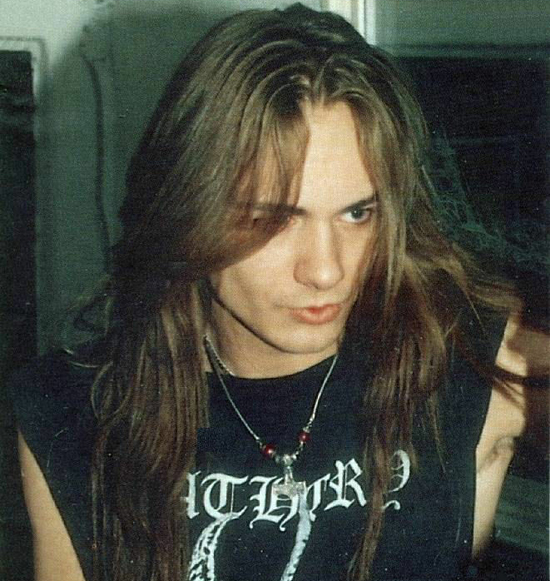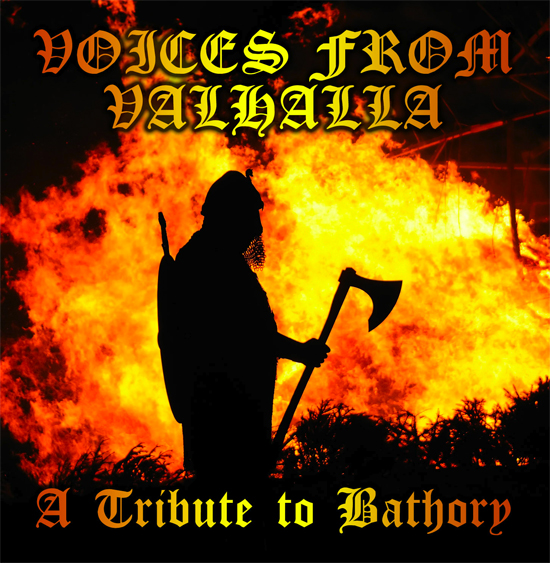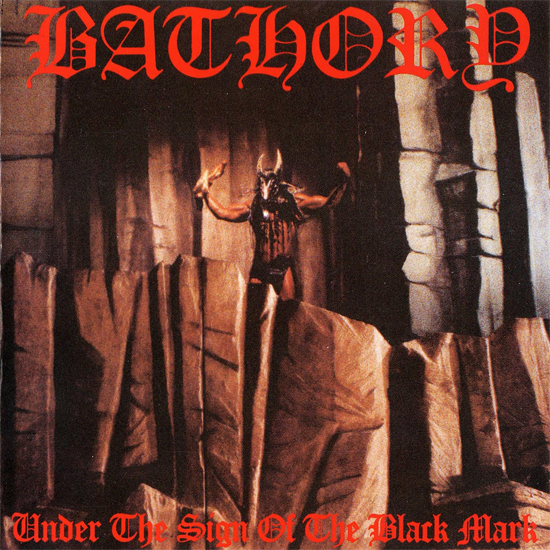Incredibly, this year marks the 25th anniversary of the release of Bathory’s seminal Under the Sign of the Black Mark. Bathory first burst into the consciousness of the metal underground in 1984. The band were formed in Sweden by Thomas Fosberg, who would become famous under the name Quorthon. Quorthon was inspired by GBH and Discharge as much as Motorhead and Black Sabbath, and the raw, primal fury of Bathory’s debut album was an utter revelation. Over the first four Bathory albums, Quorthon refined his sound, progressing at an impressive pace but remaining tightly focused on his own vision. The results speak for themselves: it’s no understatement to say that, alongside Celtic Frost/Hellhammer and Newcastle’s Venom, Quorthon was responsible for the creation of the genre now known as black metal.
On Bathory’s epic fourth album Blood, Fire, Death, Quorthon began to incorporate inspirations from Viking sagas and tales. On the subsequent two albums, Hammerheart and Twilight of the Gods, Quorthon refined these Viking influences further, creating another sub-genre, now known as Viking metal. With his involvement in the creation of two very distinct strands of metal, almost all underground metal bands today, whether consciously or not, display some inspiration from Quorthon; it’s hard to overstate his influence.
The underground was once a very different beast to the often anonymous internet-driven creature it has mutated into today. Back in the 1990s, after an excellent Cathedral gig in Dublin, I was introduced by friends to an aspiring (and now quite successful, and still true to his metal roots) comedian from Australia named Steve Hughes. His love for metal in general and Bathory in particular was written all over his jacket. There was certainly little danger of mistaking him for a nu-metal fan.
Prior to his moving to Dublin to pursue his comedic calling, Steve had been the drummer in outstanding cult Aussie thrashers Slaughter Lord (it’s well worth checking out their fine Thrash Till Death album, which features the original version of ‘Legion’, later covered to great effect by At The Gates), and is often credited with creating the now ubiquitous blast beat. Steve told me that he’d corresponded with Quorthon back in the day, and had once received a bone in reply – a rather more original response than an email, it must be said.
Quorthon would record a diverse array of material over the following years, some of which was well received by fans, some not, but he continued to remain focused on his own vision, and was held in great respect for his musical courage. In 2002 and 2003, Quorthon’s Bathory returned to the fertile well of the Viking metal they had forged in earlier years, with two very well received albums, Nordland, Part 1 and Part 2.

Thomas ‘Quorthon’ Fosberg
Tragically, in 2004 Quorthon was found dead in his apartment in Stockholm, Sweden. He was only 39, and with his passing metal lost one of its true visionaries. He had stood as the antithesis of the vapid, here-today-gone-tomorrow music that passes for so much of the modern metal scene. A part of all underground metal fans died with this much-mourned warrior.
None more so than Crin, a mainstay of the metal underground for over two decades and head of respected record label Godreah, which has released well-received records from the likes of The Meads of Asphodel and Old Corpse Road. True to its underground roots, the label grew out of his fanzine of the same name. Quorthon himself was interviewed for it, which should give some indication of the esteem in which it was held.
Having previously worked on a very well received two-CD tribute to the legendary Hawkwind, Crin decided to craft a tribute album to Bathory. Entitled Voices From Valhalla, its two discs not only feature fine original interpretations of Quorthon’s songs from bands as diverse as Mael Mórdha, Ravens Creed, and Sigh, but as a rare bonus, it features a 20-minute interview with Quorthon himself.
The Quietus met with Crin to learn about the background to this epic project.
Crin, when did you first become aware of Bathory?
Crin: In the dying age of the New Wave of British Heavy Metal and the aftermath of punk, a new form of music was born with the heavy as hell’s mantle sounds of Venom, Slayer and Metallica. Thrash came into being, and from its NWOBHM and punk-fused vibrancy, the extreme metal formula was born. These pioneers had metal aesthetics, accelerated riffs, and a dirty punk spine to give it all backbone.
There was nothing like it, no master-plan to follow. This wasn’t the birth of Norwegian Black Metal, in itself a genre born from what had already being. Nor was it Death or Grind. This was new, unique and totally captivating. Bathory was part of this golden age, untouched by the internet, untainted by the faceless assholes that pollute the entire scene today. You had to be there to appreciate just how fucking intense this music was. Bathory was a calling for me, a life-changing experience that led me towards doing the Godreah fanzine that mutated into the record label of the same name. I owe the band a debt I feel I can never repay… but I’m trying!
Speaking of Godreah, your label is about to release a major two-disc tribute to Bathory and the band’s main man, Thomas ‘Quorthon’ Fosberg. What inspired you to do this?
C: I have wanted to do this for years. I interviewed him over the phone in 1996 and knew that if I ever did do this tribute, the interview would do be part of the tribute package. It’s a personal interview, done when I was out of my head, so it sounds rather unprofessional but I don’t care. It’s a piece of history. The bands on this CD were all picked by myself, and the tracklisting is in near sequence of original release order and covers the great man’s whole career. I think it’s a great release and reflects everything Bathory were about.
Bathory helped to create the genre now known as black metal. With the plethora of generic black metal acts that exist today, do you think they’ve built from the foundations laid by Quorthon, or have they, in many cases, missed the point? Quorthon was just as influenced by punk as by Black Sabbath, and I think this is an important difference.
C: I think you can only be influenced by what you are hearing at the time. Modern black metal bands will be influenced by Mayhem and Watain, as well as Celtic Frost and Venom. The whole core embodiment of thrash metal was derived from Motorhead, NWOBHM, and punk influences. We are what we know, what we see, and what we hear.
You mention the mighty Venom, it’s curious to note that Quorthon always claimed never to be inspired by Venom, yet there seem to be many visual and musical influences from Venom on the early Bathory albums.
C: I would suggest he was. It’s an impossibility he wasn’t!
Of course, not content with forging one new genre of metal, Quorthon would leave the Satanic black metal behind to create the now thriving genre of Viking metal.
C: That’s the genius of the man. His first two raw-as-fresh-meat black metal albums disintegrated into the symphonic, subtle, keyboard driven Under The Sign Of The Black Mark album. This was a hint at what could be achieved in black metal with keyboards. The follow-up monster Blood Fire Death, gave birth to the epic Viking-themed music he would so embrace. Hammerheart is the greatest Viking metal album of them all. Anyone who says differently is either jealous or brain-dead.

When you spoke to Quorthon, what was your impression of him?
C: He was a polite, well-mannered man who was extremely passionate about his art.
Like myself, you must have felt great sorrow at his passing?
C: When someone influences your life – and that can be with music, poetry, literature – it is a very sad loss when they are gone. It’s different if you are influenced by say, The Doors, or Hendrix. Both Jims are already dead. But to experience the music when the artist is alive and to share the journey from beginning to end is great part of my life’s joys. Only a music lover will understand what I’m saying.
As someone whose love of music has led to their having been a part of the underground metal scene for many years, what are your feelings on the quality of the bands featured on this tribute? Do you feel the underground is healthy in this era of illegal downloading?
C: The scene is in complete meltdown, and this age of internet freedom, as some idiots profess it to be, is destroying the very underground they claim to be a part of. Illegal downloading is theft, and bands suffer the most. The labels are not finding it so hard, so the free promo CDs given to the mags and zines are digital downloads… That the writers and publications themselves have to download – talk about having a dog and wagging your own tail. The free physical copy of the CD was the only reward the hard-working zine and its writers got, so all these crucial publications, whether paper or web, will die out. This will result in bands not getting essential grassroots support, and the faceless internet will create a new breed of bands that will have the lifespan of a moth.
As for Voices From Valhalla, I am very pleased with the quality of the bands, but even this will be on the net, so wankers can download it illegally. They are not fans of music, just freeloaders, like benefit cheats. The only way this underground will survive is if fans buy the music.
There is certainly a pleasingly diversity of sounds from the individual bands featured on the tribute, yet it works well as a coherent body of work. Is this down to the band’s love for the music or the quality of the songs themselves?
C: A combination of both. Passion, good music and great versions of already great songs. It was hard work trying to get a good line up together as most bands who have made it, can’t really be bothered with tributes. I had to be very selective and try to get a good balance of bands and music.
Finally, Crin, what would you like to see result from the release of Voices From Valhalla?
C: I would love the legend of Bathory to be talked about again, new fans exploring the music and this tribute being embraced as a part of Bathory lore. You never know though, it may get a right slaging off…


